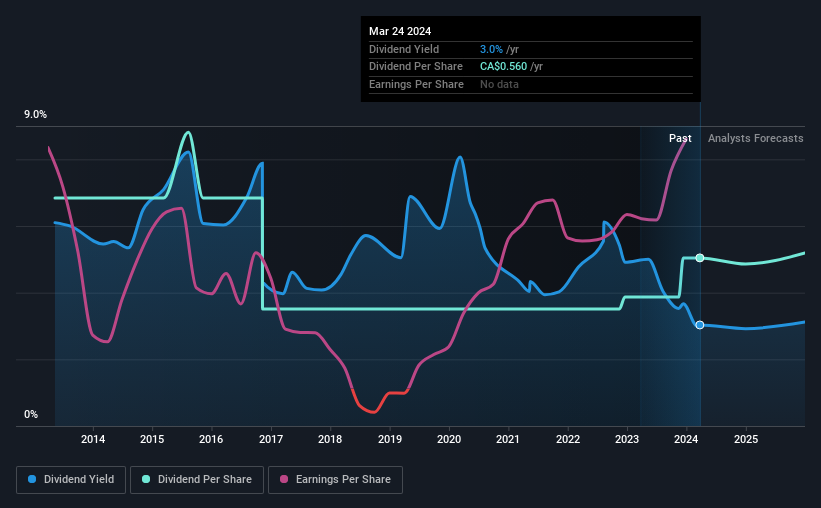Bird Construction Inc. (TSE:BDT) Looks Like A Good Stock, And It's Going Ex-Dividend Soon
Some investors rely on dividends for growing their wealth, and if you're one of those dividend sleuths, you might be intrigued to know that Bird Construction Inc. (TSE:BDT) is about to go ex-dividend in just two days. The ex-dividend date is one business day before the record date, which is the cut-off date for shareholders to be present on the company's books to be eligible for a dividend payment. The ex-dividend date is important as the process of settlement involves two full business days. So if you miss that date, you would not show up on the company's books on the record date. Meaning, you will need to purchase Bird Construction's shares before the 27th of March to receive the dividend, which will be paid on the 19th of April.
The company's next dividend payment will be CA$0.0467 per share, on the back of last year when the company paid a total of CA$0.56 to shareholders. Looking at the last 12 months of distributions, Bird Construction has a trailing yield of approximately 3.0% on its current stock price of CA$18.49. Dividends are a major contributor to investment returns for long term holders, but only if the dividend continues to be paid. So we need to check whether the dividend payments are covered, and if earnings are growing.
View our latest analysis for Bird Construction
If a company pays out more in dividends than it earned, then the dividend might become unsustainable - hardly an ideal situation. Bird Construction paid out a comfortable 32% of its profit last year. Yet cash flow is typically more important than profit for assessing dividend sustainability, so we should always check if the company generated enough cash to afford its dividend. Over the last year it paid out 50% of its free cash flow as dividends, within the usual range for most companies.
It's encouraging to see that the dividend is covered by both profit and cash flow. This generally suggests the dividend is sustainable, as long as earnings don't drop precipitously.
Click here to see the company's payout ratio, plus analyst estimates of its future dividends.
Have Earnings And Dividends Been Growing?
Companies with consistently growing earnings per share generally make the best dividend stocks, as they usually find it easier to grow dividends per share. Investors love dividends, so if earnings fall and the dividend is reduced, expect a stock to be sold off heavily at the same time. That's why it's comforting to see Bird Construction's earnings have been skyrocketing, up 34% per annum for the past five years.
Another key way to measure a company's dividend prospects is by measuring its historical rate of dividend growth. Bird Construction has seen its dividend decline 3.0% per annum on average over the past 10 years, which is not great to see. It's unusual to see earnings per share increasing at the same time as dividends per share have been in decline. We'd hope it's because the company is reinvesting heavily in its business, but it could also suggest business is lumpy.
The Bottom Line
Is Bird Construction an attractive dividend stock, or better left on the shelf? Earnings per share have grown at a nice rate in recent times and over the last year, Bird Construction paid out less than half its earnings and a bit over half its free cash flow. Bird Construction looks solid on this analysis overall, and we'd definitely consider investigating it more closely.
With that in mind, a critical part of thorough stock research is being aware of any risks that stock currently faces. To help with this, we've discovered 1 warning sign for Bird Construction that you should be aware of before investing in their shares.
If you're in the market for strong dividend payers, we recommend checking our selection of top dividend stocks.
Have feedback on this article? Concerned about the content? Get in touch with us directly. Alternatively, email editorial-team (at) simplywallst.com.
This article by Simply Wall St is general in nature. We provide commentary based on historical data and analyst forecasts only using an unbiased methodology and our articles are not intended to be financial advice. It does not constitute a recommendation to buy or sell any stock, and does not take account of your objectives, or your financial situation. We aim to bring you long-term focused analysis driven by fundamental data. Note that our analysis may not factor in the latest price-sensitive company announcements or qualitative material. Simply Wall St has no position in any stocks mentioned.

